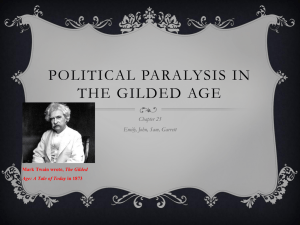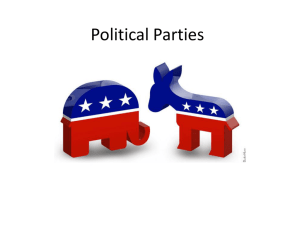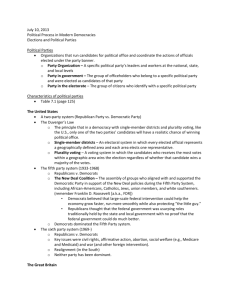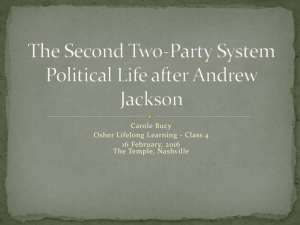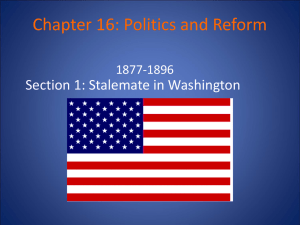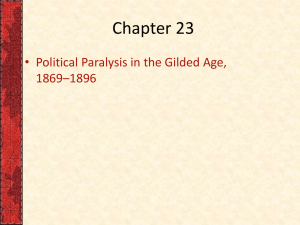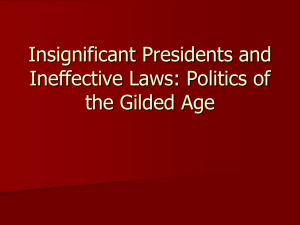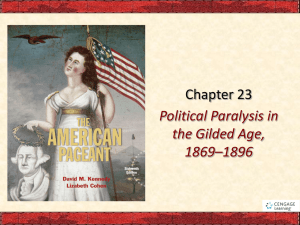Chapter 23 - Cloudfront.net
advertisement
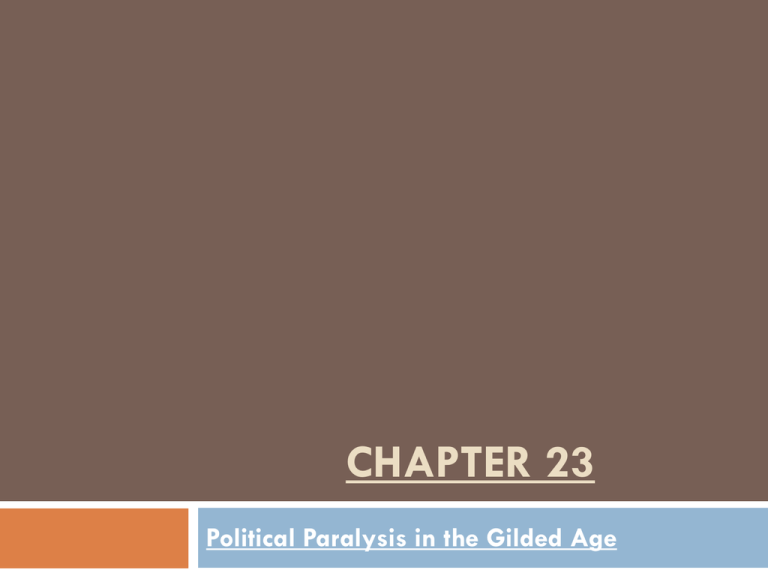
CHAPTER 23 Political Paralysis in the Gilded Age The “Bloody Shirt” elects Grant Most people believed that Generals would make good presidents so they turned to the highest—Grant He was a good leader but he knew nothing about politics He was elected on a platform of continued reconstruction The Democrats could only agree on ending reconstruction Put up Horatio Seymour Grant won 214 to 80, 3 million to 2.7 million Only won by keeping some southern states from voting and by getting the black vote The Era of Good Stealings Government and business seemed very corrupt due to a few people Jim Fisk and Jay Gould Plotted in 1869 to corner the gold market Used Grant and his brother in law and the Secretary of the Treasury Almost worked but not quite Boss Tweed Used bribery, graft, fraud, etc. to steal as much as $200 million In 1871 the New York Times found evidence against him and Thomas Nast a popular political cartoonist charged after Tweed Tweed ended up dying in jail awaiting A Carnival of Corruption Federal Gov’t was also full of corruption Credit Mobilier Scandal 1872 Whiskey Ring Construction company used as a front for the UP RR, they built the RR lines at inflated prices They bribed congressman and the VP not to say anything It was discovered by a newspaper reporter Deprived the government of excise taxes Grant’s personal secretary got acquitted of charges with Grant’s help Secretary of War Belknap was also guilty of accepting bribes from suppliers to Indian Reservations The Liberal Republican Revolt of 1872 The Liberal Republicans were formed as an anti Grant party, to reform government and make it less corrupt They put Horace Greeley (editor of the New York Tribune) up as their candidate to run against Grant Grant won 286-66; 3.5 to 2.8 million votes The Republicans ended up “cleaning house” in response to the 3rd party General amnesty act, removed high protective tariffs, and civil service reform Depression, Deflation, and Inflation Panic of 1873 Blacks were hit very hard Caused by over speculation in most areas of industry; RR, mines, factories, even farms Prices dropped and companies couldn’t pay their loans, lead to bank closures, deflation, etc Freedman’s Savings and Trust Company loaned money to banks to loan to Freedmen but they went bankrupt and blacks lost seven million worth of investments Debtors wanted cheap money— inflation Helps them pay off their debts faster Creditors wanted deflation instead of inflation They didn’t want the money they loaned out paid back in depreciated dollars Grant “grants” the hard money advocates a victory He vetoes a law that would have allowed more paper money printed Resumption Act of 1875 Silver Further withdrawal of paper money Used this precious metal as another method of trying to obtain inflation Contraction The decreasing the amount of money in circulation—leads to deflation Pallid Politics in the Gilded Age There was a balancing scale between the two parties; just a few votes could throw the elections the other way Every president barely won House majorities changed six times from 1869-91 Candidates had to straddle every fence and were too timid to try anything that would create a wake The two parties were almost identical save by name Voter turn out was at its highest ever almost 80% Why was there so much political consensus while there was so much partisan fervor? Republicans were very Puritan based Democrats had a strong influence of Catholic and Lutheran immigrants These religions stressed tolerance of differences and didn’t want government to interfere with a moral code Voting bases Strict codes of morality, gov’t involved in economy and enforcing a moral code Democrats had the south and industrial centers in the north Republicans had Midwest and the rural areas in the northeast, the GAR, Grand Army of the Republic, former Union soldiers Patronage Both parties existed and continued to exist through giving followers jobs in return for votes, kickbacks, and service The Hayes-Tilden Standoff 1876 Republicans had Rutherford B. Hayes (The Great Unknown) run in 1876 against Samuel Tilden Tilden won the popular vote 4.2 to 4 million votes but the electoral college was unclear 20 votes were in dispute and Tilden only needed one of them The states in dispute turned in two votes, one democrat and one republican, it depended on who read the votes as to who would win Compromise of 1877 Democrats threatened to go to war again Electoral Count Act Set up a commission of congressmen, senators, and judges to decide on the disputed votes Democrats allowed Hayes to become president and in return the Republicans promised to withdraw all federal troops from the South The Republicans officially abandoned the freedmen in order to have a Republican president Jim Crow South turned back into a solid Democratic block following 1877 and blacks were abandoned by the federal government Blacks were forced into sharecropping Crop-lien system Whites loaned supplies and food in return for a share of next years harvest Kept blacks perpetually in debt By 1890 the South set up a system of legal segregation called Jim Crow Laws, also had literacy tests, poll taxes, voter registration Plessey vs. Ferguson 1896 Separate but equal Blacks in fact had far inferior facilities, schools, etc Class and Ethnic Conflicts 1877 Great RR Strike Chinese Had class conflicts with the Chinese over competition for labor Chinese Exclusion Act 1882 By 1880 there were 75,000 most went to California for the gold rush, most went back to China the rest performed menial labor Irish 4 largest RR cut wages 10%, workers struck and Pres. Hayes called in federal troops to stop it People all across the country went on strike in support Ended weeks later and accomplished nothing US closed the door on Chinese immigration until 1943 US vs Wong Kim Ark 1898 If a person is born in the US they are automatically a citizen Garfield and Arthur The Blaine-Cleveland Mudslingers of 1884 Corrupt Blaine vs. Cleveland the Reformer Sank to an all time low, very few differences and no main issues, resorted to mudslinging Cleveland won 219182, 4.879 to 4.850 million Cleveland 1st Democrat president since before the Civil War (Buchanan) Firm believer in Laissez-faire Claimed he was for civil service reform but he fired 2/3rds of the 120,000 federal employees Tariff Battle Republicans in the north benefited from high tariffs ever since the war, hurt the south, also had a 145 million dollar surplus He threw the idea right into the middle of Congress Hurt Cleveland’s reelection chances in 1888 Republicans ran Benjamin Harrison (grandson of old Tippecanoe) The main issue was the tariff Harrison won 233 to 168 but lost the popular vote 5.537 to 5.447 million Billion Dollar Congress Speaker of the House “Czar” Reed went to extraordinary measures to conduct business, Democrats refused to show up so a quorum wasn’t present Spent a billion dollars—1st time in US History McKinley Tariff 1890 48.4% on goods, highest peace time rate ever Off year election the Republicans lost big the tariff hurt farmers and it brought Cleveland back Drumbeat of Discontent Populist Party started in 1892 out of the Farmers’ Alliance Platform included: unlimited coinage of silver, graduated income tax; government ownership of RR, telegraphs, telephones; direct election of senators; one term presidential limits; initiative and referendums; etc A wave of strikes in 1892 raised their prospects of bringing down the capitalist system Homestead Steel Strike at Carnegies steel mill Pinkertons tried to break it up, 10 dead, 60 wounded Federal troops called in South didn’t join the party because of race, gave the south the final push for ending black suffrage, populists became very racist Won 22 electoral votes and over one million but couldn’t get the industrial workers to join them Cleveland and Depression Reelected in 1892 took office in 1893 along with the centuries worst depression Same old story of overspeculation US was running out of gold only $41 million left in the treasury and $100 million was considered safe Turned to JP Morgan who lent the government $65 million in gold and took other measures to bring gold back from Europe Cleveland lost all credibility for turning to Morgan Republicans won back Congress


